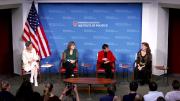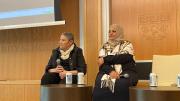For physicians in South Africa treating HIV-discordant couples—where one partner is infected and one is not—giving fertility advice has not been a high priority. When patients begin lining up before dawn and doctors’ office hours stretch into the evening, “There are so many other important issues—getting people diagnosed, getting them onto treatment, managing opportunistic infections,” says clinical fellow in medicine Lynn Matthews. But in her infectious-disease fellowship at the Harvard-affiliated Beth Israel Deaconess Medical Center, Matthews is turning her attention to these issues in South Africa’s KwaZulu-Natal province, where about 40 percent of residents have HIV.
Matthews first started thinking about the issue while working for Partners in Health in Rwanda. One of the community health educators with whom she worked was part of a discordant couple. “Everybody said they shouldn’t have kids,” Matthews recalls. “Ultimately his partner became pregnant and delivered a healthy baby, but they really suffered from stigma.”
In most of sub-Saharan Africa, she says, the mindset persists that “it’s irresponsible to have a child” if one of the parents is HIV-positive—that both partners will eventually be infected and that “the child is going to be yet another orphan in this epidemic.” But such advice means that, in a place with such a high incidence of infection, “you’re essentially asking a population to stop reproducing,” says lecturer in medicine David Bangsberg, Matthews’s research mentor.
Mother-to-child transmission is no longer a given when a mother is HIV-positive; in fact, available drugs make transmission almost completely preventable. What’s more, methods exist to allow becoming pregnant while minimizing the risk of transmission between partners, but thus far they have been used almost exclusively in wealthy countries.
In the long term, Matthews—who divides her time between South Africa and Boston—hopes to bring some of these methods into use in KwaZulu-Natal. But first, through interviews and questionnaires, she aims to get a clear idea of what couples are already doing. The results will be used to design a reproductive counseling protocol for clinics all over the province.
The idea of condoning any unprotected intercourse with an infected partner is controversial. But as Matthews sees it, giving couples the information they need to start families, while minimizing transmission risk, is not just a matter of stemming the spread of HIV—it is a matter of human dignity. And, notes Bangsberg (who has a research project in Uganda and is beginning one in South Africa), pregnancy isn’t always a luxury: “In some settings, it’s actually a necessity to have children work in subsistence farming, and also as insurance for when you are older and no longer able to care for yourself.” Women and men also face strong social and cultural pressure to start a family.
In a setting where condom use itself is a loaded subject, it’s unclear how open people will be to using, or even talking about, the somewhat involved methods that decrease the risk of transmission between partners. But the only way to raise the comfort level, says Matthews, is to start talking about them, to start asking questions, especially when, she notes, “couples are already taking these risks.”
The most reliable method of preventing transmission between an HIV-positive man and an uninfected woman, sperm washing—which involves separating sperm from the seminal fluid that carries the virus, then conducting intrauterine insemination or in-vitro fertilization—is costly and medically complicated. But there are other ways to decrease transmission risk significantly. These include making sure the infected partner is taking antiretroviral medication, as directed by a doctor, to minimize the viral load in his or her body, and limiting unprotected intercourse to the most fertile time of the month. If the woman is positive and the man is negative, the couple can skip unprotected intercourse altogether, and perform a low-tech version of artificial insemination at home using a syringe. Other promising methods for women to protect themselves against infection include microbicides and pre-exposure prophylactic drugs, although these need further development.
When couples feel that their fertility concerns are neglected, it can lead to wider distrust of the healthcare system, Matthews points out. And this distrust may lead people to stop taking their medicines or skip the regular checkups that are so necessary for HIV patients. Listening to couples’ desires and equipping them with complete information about their options makes it more likely that they will do what it takes to avoid infecting each other and their children—raising hopes that it might be possible to break the cycle of infection.








